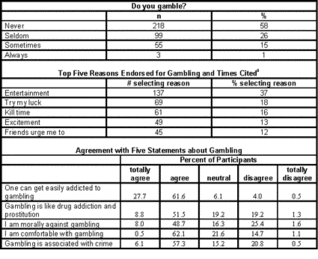The WAGER Vol. 9(38) – Mahjong Meets Vegas: Renovating the gaming industry in Macao
Gambling was first introduced to the then Portuguese-run city of Macao in 1847 in an effort to reduce the economic impact of Britain’s siege of Hong Kong. Since then gambling has been a major source of revenue for Macao, generating more than 50% of its tax revenue in the 1990s. Sovereignty was returned to China in 1999, and currently, Macao is the only region in China where institutionalized gambling is permitted. Though the gambling industry has been carefully regulated through a government-sponsored monopoly since the 1930s, the government recently decided to open the industry to private investors in an effort to bring foreign investment to the community (Kwan, 2004). As a result, gaming licenses have now been awarded to two companies with lavish casinos on the Las Vegas Strip in addition to an affiliate of the company that had held the monopoly since the 1960s (Kwan, 2004). This change in Macao’s gambling landscape provides the opportunity for a natural experiment to examine the effects of privatization on the gambling behavior and attitudes of a population that has been exposed to gambling for more than a century. This week the WAGER reports the findings of a recent study by Kwan (2004) that examined the current gambling behavior of Macao residents, their views of the gambling industry and its place in Macao’s economy, and their predictions about their own gambling behavior after the introduction of Vegas-style gambling.
The survey questionnaire asked participants about their perception of gambling and Macao’s reliance on the industry, their own gambling habits in Macao and abroad, and other demographic information. The survey was telephone administered in Chinese from June 19 to July 7, 2002. Telephone numbers were selected randomly from the local directory, and only Macao residents were interviewed. Of the 706 households called, 375 yielded useful responses (53%).
Results showed that most participants (58%) did not gamble; of the remaining participants, 99 (26%) seldom gambled, 55 (15%) sometimes gambled, and three (1%) “always” gambled (see Table 1). Most gamblers said they did so for entertainment and most gambled within their means; 95% spent 5% or less of their monthly income on gambling. The most popular gambling activities cited, mahjong, lottery and soccer betting, do not require gambling in a casino, which explains why 92% of gamblers reported that they generally did not spend time in casinos.
Table 1: Gambling Behaviors, Motivations, and Attitudes (adapted from Kwan, 2004)
a Participants could select more than one reason. Eleven options were given. Only the top five are listed.
Perhaps most interesting is the finding that a majority of participants (71%) believed that their gambling behavior would not change after the privatization and development of the industry, despite the expected improvement in gaming facilities and increase in the variety of gambling activities. This attitude is consistent with the cautious view residents have of the industry that fuels their economy. Though 63% of the participants were “comfortable with gambling” (see Table 1) and 43% were satisfied with Macao’s financial reliance on the industry, 57% were morally against gambling. Furthermore, 89% agreed with the statement “One can get easily addicted to gambling,” 60% classified gambling in the same category as drug addiction and prostitution, and 63% associated gambling with crime.
This unfavorable view of gambling and its societal impact has no doubt shaped gambling attitudes and behavior thus far. However, it is yet uncertain whether current attitudes and behaviors will remain after the expected changes in the gambling industry. One study by Jacques, Ladouceur, and Ferland (2000) reported that greater availability of gambling was directly related to greater participation in gambling activities, and studies have shown that people are exceedingly bad at predicting their own behavior in new situations (see Milgram, 1974; Ross, 1977). Further, a recent study by Volberg (2002) found that 67.9% of adult Nevada residents gambled in the previous year, and 57.8% gambled in a casino, a stark contrast to the current gambling habits of Macao residents. Keeping in mind the long history of gambling in Macao and the current attitudes and behaviors of Macao residents, it will be interesting to observe whether the imminent changes and enhancement of the Macao gambling industry affect local gambling behavior and attitudes.
Comments on this article can be addressed to Siri Odegaard.
References
Jacques, C., Ladouceur, R., & Ferland, F. (2000). Impact of availability on gambling: a longitudinal study. Canadian Journal of Psychiatry, 45(9), 810-815.
Kwan, F. V. C. (2004). Gambling attitudes and gambling behavior of residents of Macao: The Monte Carlo of the Orient. Journal of Travel Research, 42(3), 271-278.
Milgram, S. (1974). Obedience to authority. New York, NY: Harper & Row, Publishers.
Ross, L. (1977). The intuitive psychologist and his shortcomings: distortions in the attribution process. In L. Berkowitz (Ed.), Advances in Experimental Social Psychology (Vol. 10, pp. 173-220). New York: Academic Press.
Volberg, R. A. (2002). Gambling and problem gambling in Nevada. Northampton, MA: Gemini Research Ltd.
